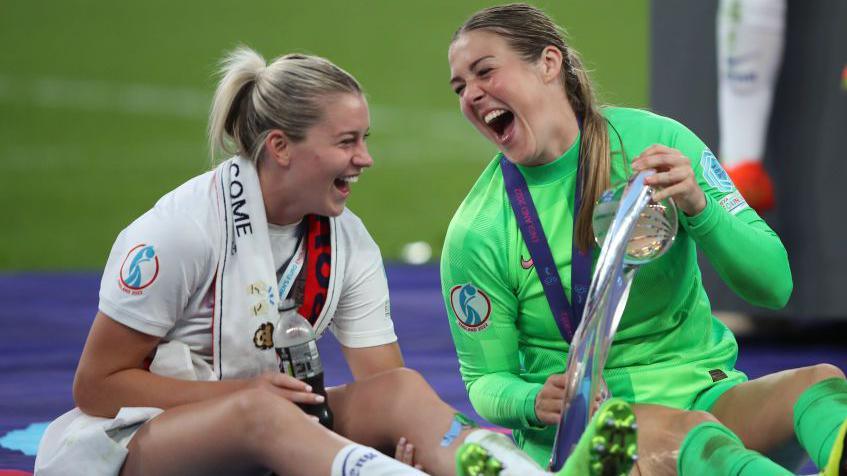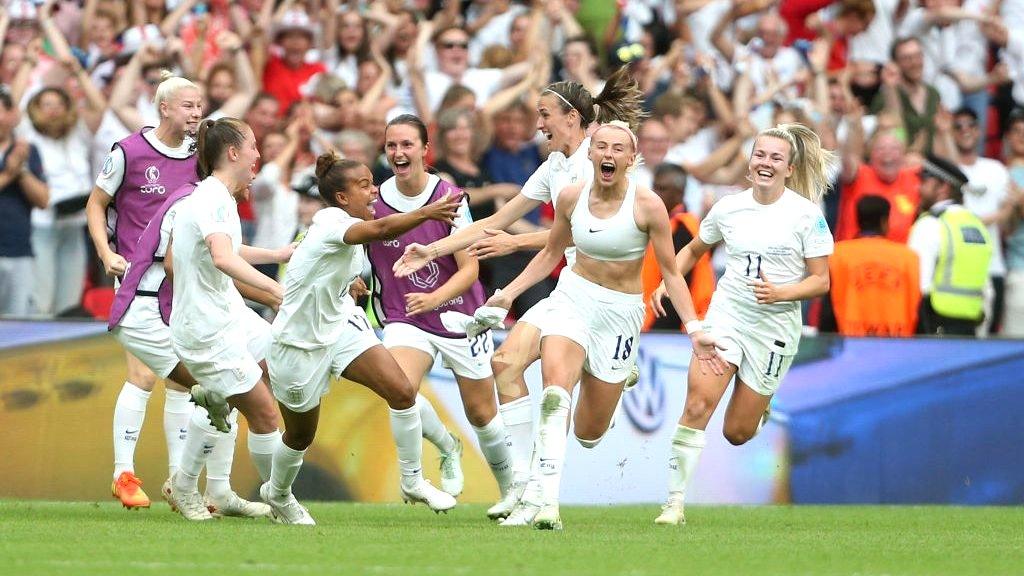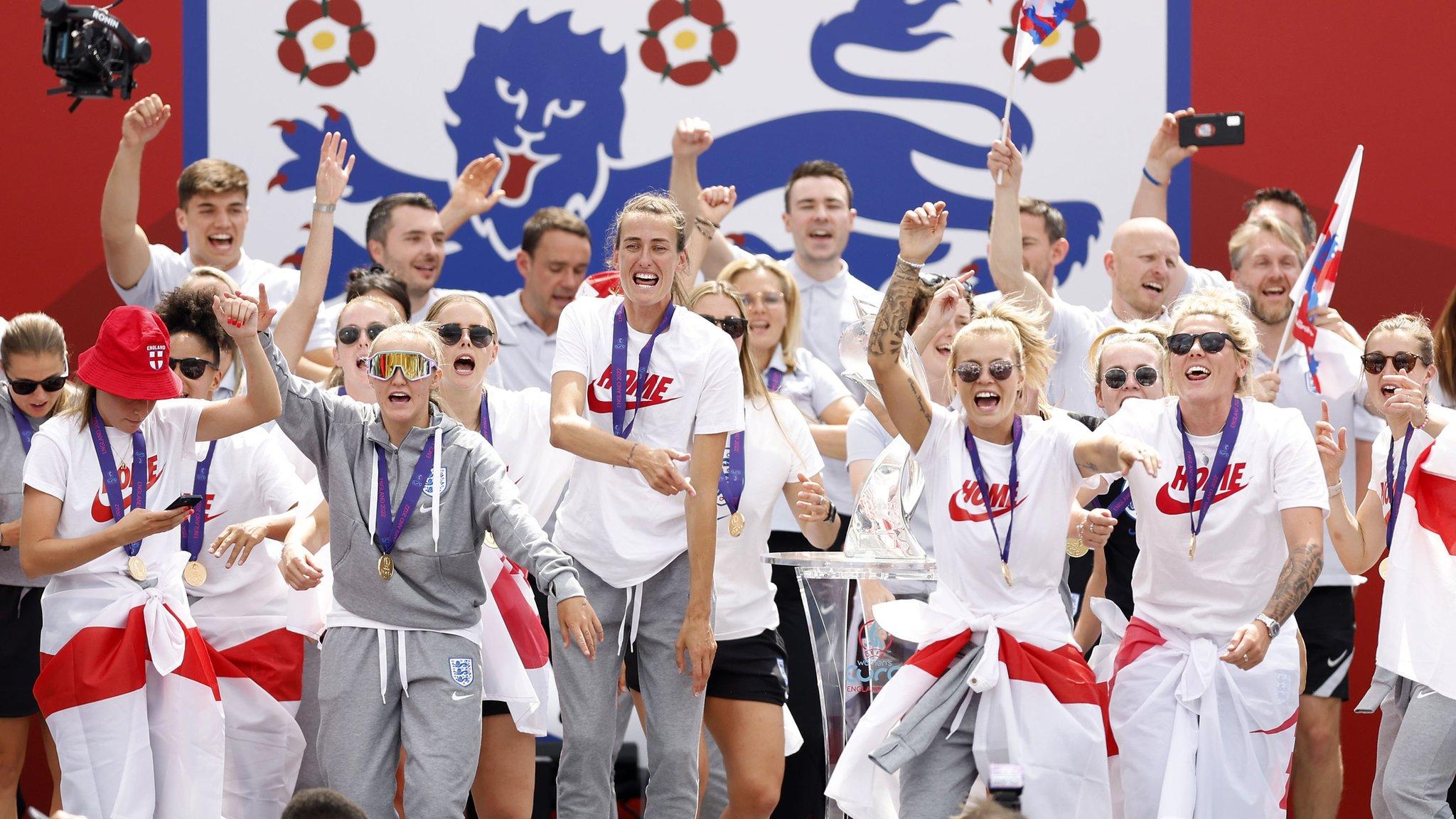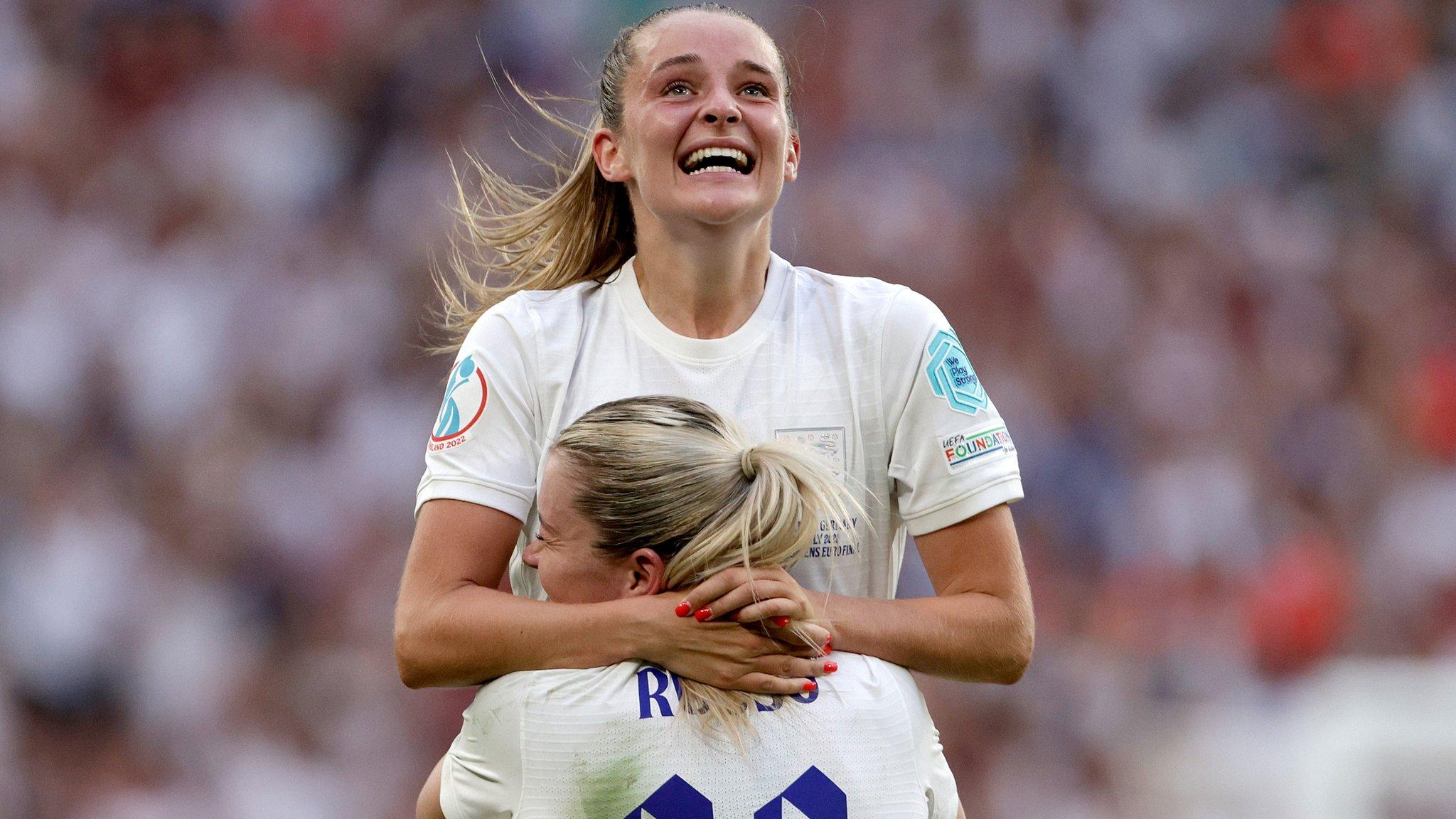Euros legacy helps 129,000 more girls take up football
'You can feel the game grow' - Earps on Euros legacy
- Published
England goalkeeper Mary Earps says she "can feel how much the game has grown" as Football Association figures reveal that, over the past four years, 129,000 more girls have become involved in schools football across the host cities of Euro 2022.
The FA say there are now more than half a million more opportunities for women and girls to play football in those areas, in comparison to 2020.
Along with the rise in schools football, 34,025 more women and girls are playing for fun, plus a further extra 10,356 playing competitively.
There are also 298 new female coaches and 247 more female referees involved in football across the cities.
As England prepare to face Switzerland on Tuesday at Sheffield United's Bramall Lane, which hosted the Lionesses' 4-0 semi-final win over Sweden at Euro 2022, the FA say they've "smashed" their targets, calling the legacy of the tournament "a real success story".
Chloe Kelly's extra-time winner secured victory for England over Germany at Wembley, the first time an England senior side had won a major trophy since 1966.
But the impact of that moment and the weeks that preceded it have resulted in much more than just silverware.
Since the tournament, Earps says she's had some "great conversations" with people who are getting back into the sport since watching the Lionesses.
"People would say, 'Ah, you know, I stopped playing football in my teens or I stopped playing football... for whatever reason,'" she added.
"But then they'd say 'watching the Euros... I was desperate to play football again and I joined a five-a-side team or I became a referee or I joined as a coach in grassroots or became involved in the game again in some capacity'.
"Obviously, my favourite ones being the goalkeeper stories, because I'm biased!"
The tournament took place in 10 host stadiums in nine locations: London, Manchester, Sheffield, Southampton, Brighton, Milton Keynes, Rotherham, Wigan and Leigh.
Each host city looked at their own gaps in provision for girls' football, which the FA used to form their legacy plan under the banner 'Inspiring Positive Change', tracking progress in participation in the game in the different areas from 2020 to 2024.
Brighton has seen the largest rise in terms of girls' schools football, with an increase of 45,938 players since 2020, with London second on an extra 28,913 and Manchester third with 22,138.
The numbers of girls playing football "for fun" has jumped by 9,560 in Sheffield, the most of the cities studied, with 6,026 extra in London and 5,550 in Rotherham.
Stacey Mullock, senior national development manager within grassroots football at the FA, says they have been overwhelmed with the success of the programme.
"Without grassroots, you know we don't really have a future England team," Mullock said.
"The game has grown so much over the last few years, and it gives us real hope for our talent pathway and what our development teams at England are looking like now because there is a bigger pool of talent to choose from.
"There is no doubt that the fact that we won, at Wembley, that summer was just everything we all couldn't even imagine dreaming of really. And it was amazing.
"But I think we would have seen growth anyway - whether it would have been on the same scale, you know, who knows?
"I think it's really helped having all of the media profiling, the personalities that we have in the squad and people that are doing such a good job to promote what women's football is all about and how it is different to the men's game, how they want to use their platform to be able to make a real change in society."
One of those personalities has undoubtedly been Earps.
England played the first match of Euro 2022 at Old Trafford, beating Austria 1-0 - and, after spending five years at United before signing for Paris St-Germain in France, she now has a mural in Manchester.
"To open the tournament there at Old Trafford was... Yeah, it was unbelievable, really," Earps added.
"I remember training at the pitch the night before and having no idea, I guess, of the journey we were about to embark on and just being super focused and being excited to play at the Theatre of Dreams."
Earps is now encouraging people to get involved in football, even if they don’t want to play. "There's so many different ways you can be involved in football. Whether that's a season ticket holder, as a fan, or a coach, ref, official, whatever."

Mary Earps (right) has been capped 52 times by England
The figures have been released as the FA's 'Inspiring Positive Change' programme comes to an end but with a new strategy, 'Reaching Higher', external, which aims to "build on the transformational success" they’ve achieved so far, in place for 2024-2028.
"We're really honing in on a few areas of the game we know we still need to look at," Mullock added. "We know we haven't yet got enough diversity across the game and it's something that we're really focused on.
"There's so much more to do. So we are really keen, excited, to do more and almost take the momentum of everything that's come off of the Euros, and go on to do bigger and better things within the women's and girls' game."
FA chief executive officer Mark Bullingham added: "Until we have the same number of women and girls playing as men and boys, there is still more work to do across the game.
"In the next four years, we will set our sights on more international success, as well as building the quality and sustainability of our women's and girls' leagues and cup competitions and developing facilities to match our ambitions."
- Published31 July 2022

- Published1 August 2022

- Published31 July 2022
